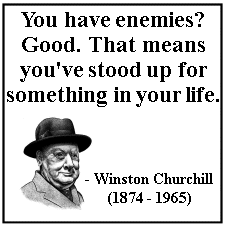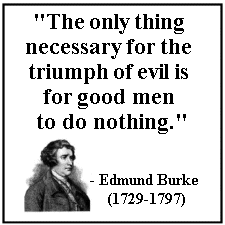 This past weekend this quote appeared across my social media feeds, and it received great response as I shared it with friends and followers. It reminded me of an ongoing dialogue about education professionalism. There are times professionalism requires us to lead by example and there are times it requires us to speak out.
This past weekend this quote appeared across my social media feeds, and it received great response as I shared it with friends and followers. It reminded me of an ongoing dialogue about education professionalism. There are times professionalism requires us to lead by example and there are times it requires us to speak out.
In the darkest, most dismal days of the last century, again and again, Winston Churchill’s voice consistently spoke up for what is good and right and decent in all of us, even as his contemporaries faded away and new unimaginable circumstances arose in front of him. By speaking loudly and clearly and with moral authority, Churchill gave strength to millions of people at home and around the world who shared his beliefs. Even as the twentieth century became recorded history, Churchill continued to speak out the rest of his life as the Lion of Britain. He knew he had a moral imperative to do so.
Unfortunately, what made Churchill’s roar so admirably distinctive was that, through transgression and atrocity, too many of us were willing to quietly look the other way and just muddle along and get along in our quiet lives. Historically these moments have occurred in reaction to emergencies: outbreaks of war, disease and natural disasters. Every generation is faced with challenges which they must either stand up and face or quietly look the other way. If everyone had vocalized Churchill’s sentiments, many more lives could have been spared over the last hundred years.
Churchill had to have been rattled to his core through two world wars, communist domination of eastern Europe, and the dawn of the nuclear age. There was much at stake in crisis after crisis…more life-and-death decisions than most of us will ever face in our lifetimes. But in the bleakest most exhausting moments of the Second World War, he boldly proclaimed to his countrymen that “This is their finest hour.” How could he espouse such words at a time when the second “war to end all wars” was playing itself out? He stuck to his principles, voiced them publicly, and in so doing displayed a courage and a vision that defied immediate threats.
Standing up for education is different. It’s not about reacting to an immediate crisis…it’s about advocating for the future. It doesn’t carry that immediate call to action to fend of an impending attack. Nonetheless, it requires those of us invested in the cause to speak up for what we know to be good and true and right about public education’s role in the future of our civilization. Yet most of us in education today have our heads down and are trying to quietly get along during difficult times. As one colleague remarked, “Educators know what’s at stake. But they’re scared to say or do anything about it.”
 Fear is an understandably human emotion…one that can powerfully impact our motivations and actions. Each of us has a choice…and the choice we make has consequences. Will you speak up for what is good and right for public education, even as your leaders and colleagues continue to plod along with business-as-usual? Or will you settle for the status quo and allow the future of public education to be co-opted by political and commercial interests who do not have your insight and investment in the value of a free public education for all? Speaking out is a moral imperative...we need your voice...now.
Fear is an understandably human emotion…one that can powerfully impact our motivations and actions. Each of us has a choice…and the choice we make has consequences. Will you speak up for what is good and right for public education, even as your leaders and colleagues continue to plod along with business-as-usual? Or will you settle for the status quo and allow the future of public education to be co-opted by political and commercial interests who do not have your insight and investment in the value of a free public education for all? Speaking out is a moral imperative...we need your voice...now.




No comments:
Post a Comment